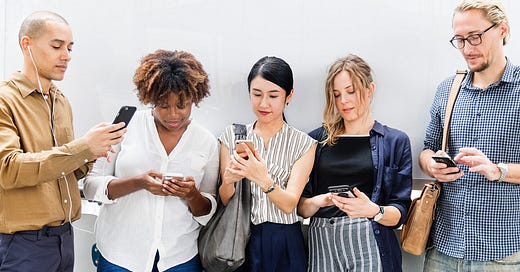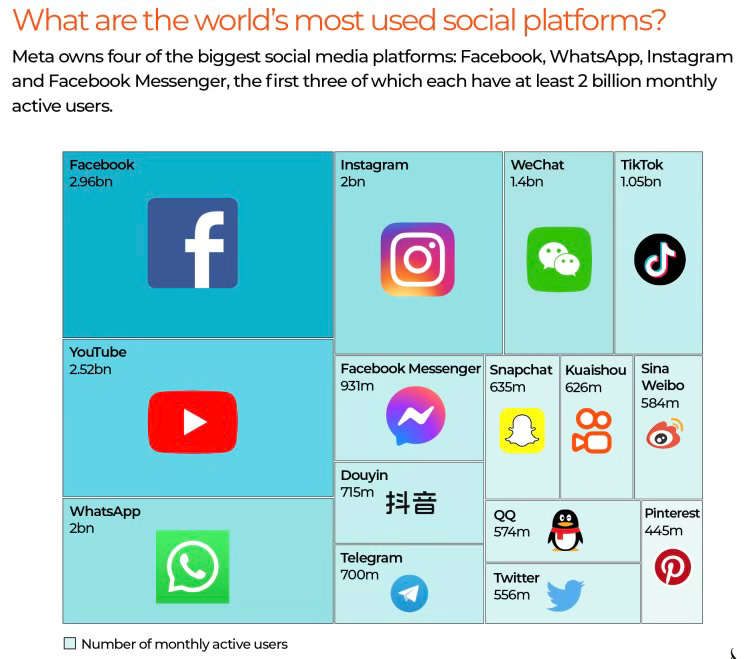How being connected to our phones can disconnect us from one another
Tell me about how you use your smartphone and social media apps
There’s a lot of discussion in the news about the impact of social media and smartphones on kids and young adults due to Jonathan Haidt’s new book “The Anxious Generation,” which suggests children’s brains are being “rewired” and their mental health is endangered. Haidt argues there’s an “epidemic of mental illness” among children born after 2000, and he suggests four ways to combat this: no smartphones before high school, no social media before age 16, no phones in schools, and prioritizing real-world play and independence.
But what about the impact of social media on adults?
Phones and social media have become a ubiquitous part of our everyday lives, but there’s no easy answer to how exactly these technologies affect the mental health of adults. In 2023, social media was in the hands of an estimated 4.9 billion people worldwide, with Facebook leading the pack as the most-used platform. Nearly 60 percent of the world uses social media, and the typical user spends more than two hours a day on it. That’s 864 hours a year of scrolling through apps, equivalent to 36 days or a little over a month.
Despite living in a more connected world than ever, a staggering 63 percent of people on social media report feeling lonely. Studies show the constant stream of notifications and updates can create a sense of urgency and a fear of missing out, leading to increased anxiety and stress. When people constantly compare their lives to what they see on social media, it can lead to increased feelings of worthlessness and inadequacy, which can eventually turn into depression. And when someone is addicted to their phone, it can harm their relationships with family or partners. The excessive use of smartphones can also interfere with sleep, which is crucial for mental health.
But it smartphones aren’t just isolating us from each other — it can divorce us from our humanity. In a recent podcast interview, Rabbi Sharon Brous and I delved into how social media is paradoxically fostering a more disconnected society, contrary to its original intent of bringing us closer. Rabbi Brous shared the steps she’s personally taken to regulate her own use of social media and devices, emphasizing the importance of prioritizing real-world interactions over virtual ones. “Social media was ostensibly established to help people connect with each other, but I think now that it has become such a toxic platform,” Rabbi Brous says. “I have completely disengaged for my own wellness because the algorithm favors extremism.”
I’m interested in talking today about your experience with social media. Listen to the clip above (and the whole podcast here), and let me know how you describe your current relationship with social media. How much time do you spend on social media platforms, or have you sworn them off? What do you think social media does well, and where does it fail us? How has it affected your mental health or your family’s mental health? What changes have you made or do you plan to make regarding your social media usage (or your kids’)?







As Gen X- I grew up without this technology and I’m so grateful that I did. I didn’t even have a cell phone or a laptop until I was somewhere in my 30s, slightly behind the general curve., In person connection feels so vital, for immediate and all the senses joys and learning how to navigate a social world that’s both intuitive and overtly expressive. I’m so brightened by in person time with friends and banter with day to day run ins with acquaintances and strangers . Real time off the cuff convos have a different cadence and can lead to different places than emessgaes. The timbre of a voice is an added dimension of connection and feeling/knowing a person. It’s a much more three dimensional and sensory world offline.
I have mixed feelings about social media .I reap some significant benefits . I’ve dealt with health issues that have meant that smart devices are an essential way to connect with people when I can’t in person. And sometimes it takes less energy when I need to conserve spoons to send some texts, with breather time in between than hold a conversation. I feel like I have gotten windows into worlds and learning that I wouldn’t have as easy access to otherwise. These are large and appreciated gifts.
Yet I absolutely prioritize real time connection and being in the world whenever I have the capacity. In every possible window I go out and about, walking, befriending, cooking,… I also try as much as possible to do online courses or make art in downtime.
I try to find a balance that works for now, which will change as am am able….sometimes that means a day of watching animals make friends on YouTube, other days a long walk in the woods and six hours of art. I try not to judge which I need either way.
This is an excellent, thought-provoking post. Believe it or not, I have a healthy relationship with social media. I use it to promote my writing and art. However, I can see how phones can disrupt our lives, especially those of younger generations.
I grew up without social media. While I understand that exposure to social media can cause anxiety and depression, I know that conditions such as mental health issues existed in abundance before social media hit the scene. But it wasn't talked about back then. Social media can be a lifesaver, where people who are struggling can bond more easily with a like-minded community.